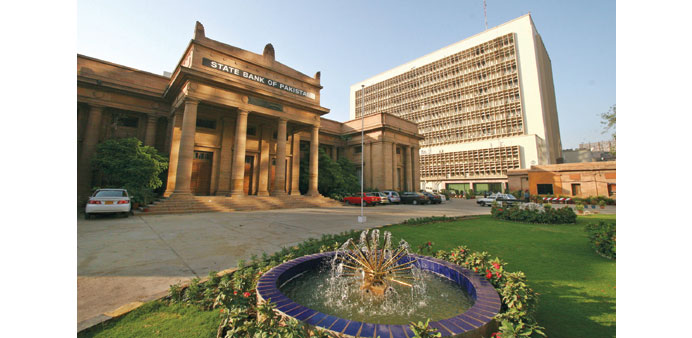State Bank of Pakistan in Karachi. Pakistan is planning to set up a new monetary policy committee which will replace the current structure, in which the central bank’s board of directors decides on the benchmark rate based on recommendations from an internal advisory panel.
Bloomberg
Karachi
A committee of Pakistan’s top economic minds will set the benchmark interest rate starting early next year, as the central bank takes its biggest step yet towards greater autonomy.
The 10-member panel may be established in six to eight weeks, possibly in time for the next policy review in January, State Bank of Pakistan governor Ashraf Mahmood Wathra said in an interview on Wednesday. The government’s role will be limited to approving or rejecting three independent economists nominated by the central bank’s board, he said.
“This development makes us outstanding in terms of an independent monetary policy committee,” Wathra said at his office in central Karachi, the financial capital of Pakistan. “I don’t think that there is a major shift in views or ideas from where we are, but the optics definitely improve a lot.” Central banks round the world have long struggled to establish independence from their nations’ governments, seen as providing insulation for monetary policy from political interests. The Pakistan development coincides with a push by the governor of its Indian counterpart to set up a new monetary policy committee, charged with achieving a formal inflation target.
The change is part of an overhaul of Pakistan’s central bank that began after Prime Minister Nawaz Sharif took a $6.6bn loan package from the International Monetary Fund in 2013. The bank introduced an interest-rate corridor to better manage liquidity and is taking steps to avoid financing fiscal deficits that have drained the country’s coffers.
“A fully independent and operational monetary policy committee will further enhance credibility of the SBP’s decision-making process, bringing it in line with global standards,” said Bilal Khan, an economist with Standard Chartered.
The central bank last month kept its discount rate unchanged after cutting it by 300 basis points since January, the most in Asia during that time, to a 42-year low. The monetary authority may revise down its inflation forecast for the year through June to below 4%, Wathra said, after consumer-price growth reached the lowest in at least six years under the most recent data series.
“Last policy meeting we decided to take a pause, so it’s kind of wait-and-see for now,” he said.
The new monetary policy committee will replace the current structure, in which the central bank’s board of directors decides on the benchmark rate based on recommendations from an internal advisory panel.
Not everyone is convinced that the body will be able to demonstrate independence from the government. While the move is “positive,” the culture of political interference is entrenched and will be difficult to change, according to Muneeba Shoaib, an economist with AKD Securities.
“Independence as far as state bank is concerned, as far as monetary policy is concerned, is impossible because political motivation is there, lobbying is there,” she said by phone.
Pakistan’s economy is set to expand 5% this year, the most since 2008, as Sharif’s government takes steps to tackle power shortages and Islamic militancy that have held back growth. Yet weak global demand has hurt exports even while the Pakistani rupee sank to the lowest since early 2014.
“There has been a round of weakening of currencies in the region and globally, and the trend is not settling down as yet,” Wathra said, noting that overseas sales might pick up in the coming months due to the weaker currency. “As a relatively smaller economy, we are not immune to whatever is happening in the world.” Wathra expressed confidence that Pakistan would complete its IMF loan programme next year, something it has failed to accomplish several times in the past. He’ll have a “fair idea” in several quarters on whether Pakistan would need more funds from the lender.
The most difficult loan conditions included passing laws in parliament and on the fiscal side, Wathra said. The government fell short of its budget deficit goal in the 12 months that ended in June, prompting officials to look for more ways to raise revenue to meet the target in the current fiscal year.
“Whenever you start a reform, the initial steps are somewhat easier,” Wathra said, referring to the IMF programme. “Every subsequent quarter is becoming tougher, but I think we will survive.”

